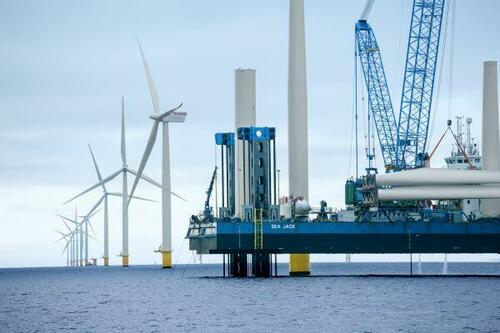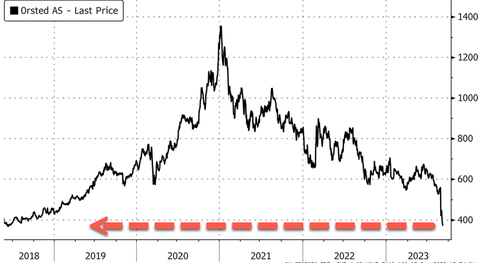Turbulent Times For Biden’s Offshore Wind Farms As Orsted CEO Warns: Abandoning US Projects A ‘Real Option’
The world’s largest offshore wind farm developer is preparing to walk away from US projects unless the Biden administration guarantees more support, Bloomberg reported.
“We are still upholding a real option to walk away,” Orsted CEO Mads Nipper told Bloomberg in an interview in London on Tuesday.
Nipper continued, “But right now, we are still working towards a final investment decision on projects in America.”
The Biden administration has touted offshore wind farms as an essential component of decarbonizing America’s grid, but soaring inflation costs have undermined the sector’s growth and left many projects dead in the water.
Under the Inflation Reduction Act, Orsted receives upwards of 30% tax credits, but more appears to be needed as a financial crisis is unfolding in the offshore wind power industry.
Nipper has asked the Biden administration to guarantee subsidies without the domestic content requirement and requested more time to overcome supply chain snarls in sourcing US-made materials.
“What we proposed was a grace period, say, so give us three to five years,” the CEO said, adding, “Right now, it can’t deliver.”
More from Bloomberg on Nipper, who warned offshore wind farm plays are ‘uninvestable’:
Orsted’s delays were triggered by bureaucratic uncertainties during the previous US administration and were intensified by supply-chain disruptions during the COVID-19 pandemic. Biden’s push on clean energy helped accelerate some plans, but high-interest rates and delays in procuring foundations, known as monopiles, for its wind turbines slowed developments even more.
Because final investment decisions weren’t made and the projects were being funded by the company’s balance sheet, the fact that long-term interest rates in the US soared above 3% means Orsted’s cost of capital is higher.
“For a company like ours, where the targeted range of returns is 150 to 300 basis points above our cost of capital, it has essentially made this extremely tough,” Nipper said.
Nipper said Orsted couldn’t have predicted the industry turmoil, yet an investor selloff saw the company lose $8 billion in value last week after impairments were booked on several US projects. Longer-term plans also are at risk, with developments near New Jersey and Delaware not investible right now, he said.
Last month, Nipper warned investors on a conference call: “The situation in US offshore wind is severe.” As we noted, “snarled supply chains, soaring interest rates, and easy money tax credits drying up” is a “warning sign the green energy revolution bubble is in trouble.”
Shares in Denmark-listed green energy giant have crashed in recent weeks on the mounting headwinds — now back to levels last seen in 2018.
The Biden administration’s ambitious goal of achieving 30 gigawatts of offshore wind energy capacity by 2030 appears to be in jeopardy. Even though the Inflation Reduction Act was supposed to ease inflation, a green energy crisis has emerged, as Orsted describes, that stems from inflation.
We have asked the question: Is The ESG Investing Boom Already Over?
It seems so, given that Shell, Europe’s leading oil company, has discreetly set aside the world’s most expansive corporate initiative to create carbon offsets. Meanwhile, Europe’s ‘green tech’ future has been threatened due to waning investment flows.
Tyler Durden
Fri, 09/08/2023 – 05:45
via ZeroHedge News https://ift.tt/fRaJE0z Tyler Durden

